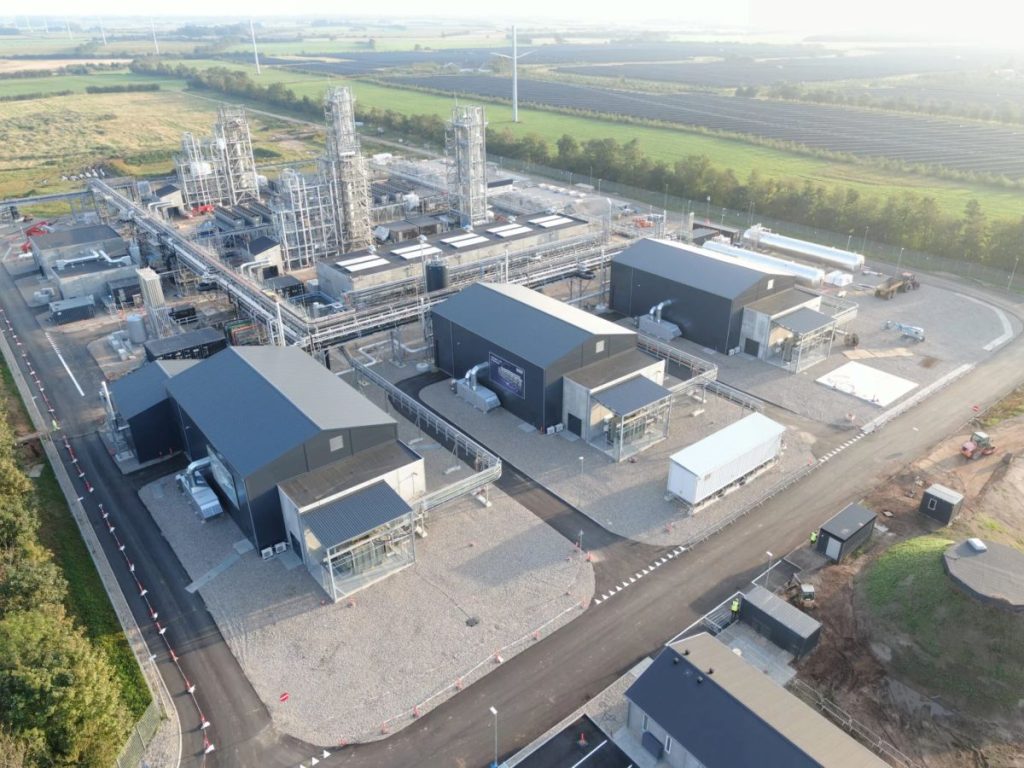European Energy’s Kassø Power-to-X facility in Aabenraa, Denmark, has become the first methanol plant to receive EU green fuel certification under the ISCC scheme. This stamp of approval means its e-methanol can now be sold for use in shipping, aviation, and heavy industry across Europe. Google announced its partnership with P2X Solutions to Advance Green Hydrogen Production in Finland.
The International Sustainability and Carbon Certification (ISCC) EU scheme has confirmed that European Energy’s Kassø Power-to-X facility’s e-methanol meets the Renewable Energy Directive’s criteria for renewable fuels of non-biological origin (RFNBO).
This certification enables the e-methanol to be utilized under the EU’s FuelEU Maritime and ReFuelEU Aviation regulations, as well as in national quota systems, facilitating its adoption in sectors like shipping, aviation, and industry.
Rene Alcaraz Frederiksen, CEO of Solar Park Kassø, remarked, “The ISCC EU RNFBO certification is an important step in validating the renewable integrity of our e-methanol and ensuring it can support climate action across Europe.”
The Kassø facility, developed in partnership with Mitsui & Co., boasts an annual production capacity of 42,000 tonnes of e-methanol. This renewable fuel is supplied to international clients, including Danish shipping giant Maersk.
The plant produced its first five tonnes of e-methanol on March 12, 2025. Plans are in place to ramp up production during the second quarter of 2025, utilizing three electrolyzers from Siemens Energy and a methanol loop designed by European Energy.
Nordic E-Methanol Projects Gain Momentum
This EU for Kassø Power-to-X certification in Denmark inspires green e-methanol initiatives across the Nordic region, encouraging investors and developers to advance projects in Sweden, Finland, and Norway. The region has, after all, abundant renewable resources and industrial infrastructure.
In Sweden, Liquid Wind is spearheading multiple e-methanol projects. The company recently announced plans for a new facility in Örnsköldsvik, aiming to produce approximately 100,000 tonnes of e-methanol annually. Claes Fredriksson, CEO and founder of Liquid Wind, emphasized the project’s significance:
“We see a very strong desire from customers and fuel users to transition to sustainable fuels, something our facility in Örnsköldsvik will contribute significantly to.”
Google Partners with P2X Solutions in Finland
In Finland, P2X Solutions Ltd is progressing towards a final investment decision on a 40-MW e-methanol project, bolstered by a €60 million investment grant. This financial backing underscores the growing confidence in Finland’s potential to become a key player in the green fuel sector.
Google has announced its partnership with P2X Solutions to support the development of green hydrogen infrastructure in Finland. This collaboration aims to integrate renewable energy sources, such as wind power, into the production of green hydrogen, contributing to Finland’s goal of becoming a leader in sustainable energy. The partnership underscores Google’s commitment to investing in innovative energy solutions that reduce carbon emissions and promote environmental sustainability.
Statkraft’s Ambitious Plans in Norway
Norway’s Statkraft is also making strides in green hydrogen and e-methanol production. The company has set an ambitious target of developing 2 GW of green hydrogen capacity by 2030. Bjørn Holsen, Senior Vice President of the Hydrogen department at Statkraft, highlighted the company’s commitment:
“Renewable power and batteries can’t solve the climate crises alone. We also need green hydrogen, and we need a lot of it.”
In 2023, Norwegian start-up H2Carrier unveiled a plan to produce green hydrogen and ammonia on board a ship connected to a 1.5GW onshore wind farm in western Greenland.
Catalyzing Investment and Innovation
These initiatives reflect a broader trend in the Nordic region, where the EU’s certification of e-methanol is catalysing investment and innovation in green fuel technologies. The certification not only validates the sustainability of e-methanol but also enhances its commercial viability, paving the way for its integration into sectors like shipping, aviation, and heavy industry. The momentum in the Nordic e-methanol landscape signifies a collective commitment to reducing carbon emissions and fostering sustainable energy solutions, positioning the region as a leader in the global transition towards green fuels.
Read More:
- European Energy: E-methanol from Kassø gets first ever EU certification on green fuels
- PowerMag: Google Invests in Partnership to Develop Energy Assets at Data Center Parks
- Seatrade Maritime News: Liquid Wind picks up suspended Swedish e-methanol project, doubles capacity
- Statkraft: Hydrogen: A new market on its way
- Liquid Wind: Ørsted breaks ground on FlagshipONE – Liquid Wind’s first electrofuel development project
- PWC: Energy transition and its impact on transactions
- Hydrogen Insight: Plan unveiled to produce green hydrogen and ammonia on a ship connected to a 1.5GW wind farm in Greenland

